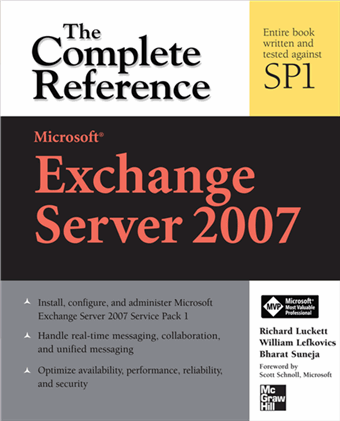In an earlier post, I tried to answer some questions about Exchange versions (32-bit and 64-bit issues), amongst other things [read previous post: "Exchange Server 2007: Questions before business launch"].
Users have a lot of questions about the differences between Enterprise and Standard editions, the 32-bit version strictly meant for testing/learning (and not supported in production) including questions about what "in production" really means, and licensing, amongst other things. This is evident from a number of posts on Exchange newsgroups and other forums.
Scott Schnoll has a comprehensive and well-written post on his blog that answers many of these questions - Exchange Server 2007: Platforms, Editions, Product Keys and Versions.
Exchange Server 2007: Platforms, Editions, Product Keys and Versions.
Things to note:
- The 32-bit version is always Standard Edition
- The 32-bit version does allow clustering - both SCC (Single Copy Cluster - aka "clusters-as-we-knew-them-circa-Exchange-2000/5.5") and CCR (Cluster Continuous Replication) - else you wouldn't be able to test these on 32-bit systems/virtual machines
- There are no plans to release service packs for the 32-bit version (perhaps to further discourage users from deploying the 32-bit version in production - Bharat)
- Virtualization: Exchange Server 2007 is not supported in virtual environments (yet) - Microsoft Virtual Server 2005 R2 doesn't support 64-bit VMs (virtual machines running 64-bit guest OS - though Virtual Server 2005 R2 software is available in a 64-bit version that can run on x64 processors). Before you ask, no official support for VMWare either - which does support 64-bit VMs.
Users have a lot of questions about the differences between Enterprise and Standard editions, the 32-bit version strictly meant for testing/learning (and not supported in production) including questions about what "in production" really means, and licensing, amongst other things. This is evident from a number of posts on Exchange newsgroups and other forums.
Scott Schnoll has a comprehensive and well-written post on his blog that answers many of these questions -
 Exchange Server 2007: Platforms, Editions, Product Keys and Versions.
Exchange Server 2007: Platforms, Editions, Product Keys and Versions.Things to note:
- The 32-bit version is always Standard Edition
- The 32-bit version does allow clustering - both SCC (Single Copy Cluster - aka "clusters-as-we-knew-them-circa-Exchange-2000/5.5") and CCR (Cluster Continuous Replication) - else you wouldn't be able to test these on 32-bit systems/virtual machines
- There are no plans to release service packs for the 32-bit version (perhaps to further discourage users from deploying the 32-bit version in production - Bharat)
- Virtualization: Exchange Server 2007 is not supported in virtual environments (yet) - Microsoft Virtual Server 2005 R2 doesn't support 64-bit VMs (virtual machines running 64-bit guest OS - though Virtual Server 2005 R2 software is available in a 64-bit version that can run on x64 processors). Before you ask, no official support for VMWare either - which does support 64-bit VMs.
Labels: Administration, Exchange Server 2007

 Exchangepedia Blog is read by visitors from all 50 US States and 150 countries world-wide
Exchangepedia Blog is read by visitors from all 50 US States and 150 countries world-wide



0 Comments:
Post a Comment
Links to this post:
Create a Link
<< Home